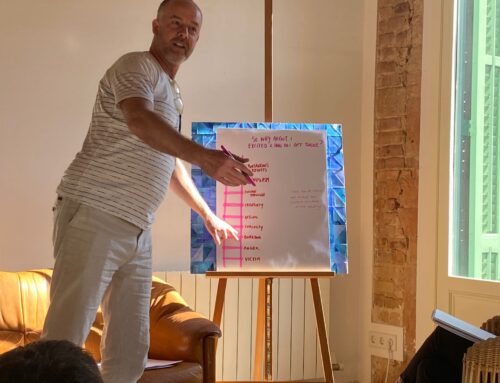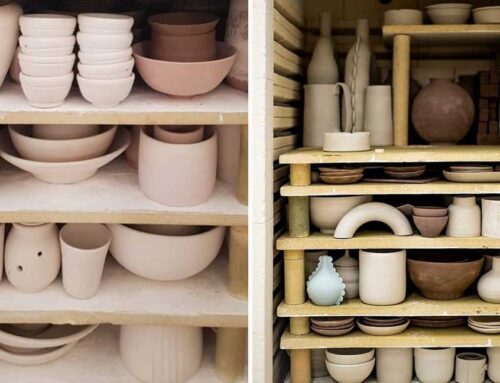 Here at ElTorn we have people from all over the world: England, Ireland, France, Switzerland, Germany, Russia, Brazil, Greece, Argentina, China, Canada, US and from different parts of Spain. Coming every week; working on their projects; sharing thoughts and ideas… and food – our lunch breaks are always a great fun.
Here at ElTorn we have people from all over the world: England, Ireland, France, Switzerland, Germany, Russia, Brazil, Greece, Argentina, China, Canada, US and from different parts of Spain. Coming every week; working on their projects; sharing thoughts and ideas… and food – our lunch breaks are always a great fun.
Sharing my life with this great, mixed group of people made me think about stereotypes… “…a fixed, over generalized belief about a particular group or class of people.” (Cardwell, 1996). Together with the definition, I found: “the advantage of a stereotype is that it enables us to respond rapidly to situations because we may have had a similar experience before. And the disadvantage is that it makes us ignore differences between individuals and we generalize”. Searching about it I’ve found some “weird” and some so called “true” stereotypes about different nationalities – let’s see what you think about then:
When thinking about Brits – be honest – it comes to your mind that they have terrible food. Don’t be mistaken: England is a fantastic place to eat with a hugely varied cuisine from all around the world. It’s said to have the best Indian food on the planet (apparently, even better than India). On the other hand, you think that Brits love drinking tea… most of the time, is right. Tea annual consumption per capita in United Kingdom is around 1.941 kg (68.5 oz) … according to Wikipedia…
Germans love rules. The amount of over-regulation in Germany can sometimes lead to a certain inflexibility. However, it’s clearly their ability to organize and create structure which has earned them their reputation for being efficient. There is even a government office called Ordnungsamt, which literally translates to “office of order.” On the other hand, Germans aren’t all about the sausage. The country may consume 2.5 million tons of wurst annually, and have 1,500 varieties, but nowadays the number one fast food in Germany isn’t Bratwurst, but the Döner Kebab. This relatively recent addition to the nation’s taste palette arrived with Turkish immigrants in the 1970s.
My French friends will have to excuse me, but this isn’t a stereotype, but a fact: in the old Parisian cafés, don’t expect any smiles or kind words of welcome. Don’t be surprised if the waiter shows impatience if you take too long to choose your plate. And don’t be surprised if, after that “service”, he expects a tip from you! However, I’ll defend my friends from the most stupid stereotype ever: “French people sell a lot of perfume, isn’t that the ultimate proof that they stink?”. I must say, after visiting and living in many different countries, I can assure you that French people don’t stink more than anyone else. Apparently, this idea has much to deal with 15th Century French habits…. thus, long time ago… so we can let this stereotype go!
When thinking about Russians – we think about vodka and that they are capable of drinking vodka like water. It would be to simple to just stop here, so I went on investigating and found that the biggest thing to understand about Russian vodka culture is that vodka is never, ever drunk without a reason. An everyday dinner in Russia is not accompanied by vodka the way an everyday dinner in France may come with a glass of wine. Russians instead will only drink when there’s an occasion: a wedding, a funeral, the birth of a child, a business deal sealed… We also tend to think that Russians don’t like to smile. That’s kind of true, but it’s not because they’re not funny or happy. Russians are hilarious. But culturally, they don’t smile at strangers for the sake of being “polite” because they consider this gesture weird and a waste of time. I don’t know if it’s true (Russian friends, please confirm) that there’s even a Russian proverb that translates, roughly, to “laughing for no reason is a sign of stupidity.”.
And of course, we Spaniards also have plenty of stereotypes. The most common I’d say is that we take naps daily. No one’s denying that we invented the siesta, but that doesn’t mean that we take one every day (we wish!).
But, it’s true that we’re in a different schedule from much of the rest of Europe. We start the day very late, we eat lunch late, we eat dinner incredibly late, and we go to bed even later.
Stereotypes being right or wrong, this is a fact: while our German students already booked their spot in our Week-long wheel throwing course (with 6 months advance!), I’m pretty sure our dearest Spanish ones may let it to the last moment! Not to worry, we still have few spots available …. Ok folks, finished the text…. I’m going to take a nap…
Un abrazo! Paula





